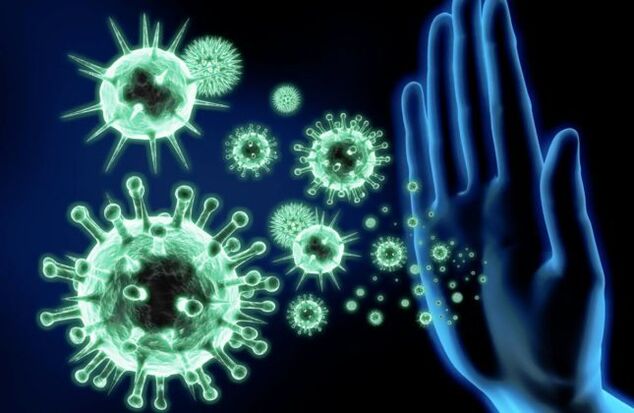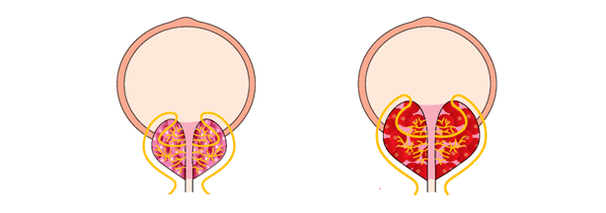Inflammation of the tissues of the prostate gland is quite common, the cause of prostatitis in men is infection and blockage. According to statistics, after 30 years, 30% of men have suffered from this disease, and with age, this number is increasing and the disease is getting younger. As you know, the best treatment is prevention, and if we know the cause of a particular pathology, it is easier to protect ourselves from it.
Where does prostatitis come from?
The clinical picture of the disease can include a variety of symptoms. The most common and significant are urinary disorders and sexual dysfunction. In each case, the set of symptoms and the degree of their manifestation depend on the individual characteristics of a man, namely on his lifestyle, general health and the functioning of the immune system.

For these reasons, it is customary to distinguish two forms of the disease:
- infection
- stagnation.
The reasons for the development of infectious prostatitis
In the infectious form of the disease, the causes of prostatitis are pathogenic microorganisms. In this case, the disease develops when an infection forms in the prostate gland. It can occur in both acute and chronic forms, but infectious prostatitis is usually more acute. At the same time, the man's general appearance deteriorated, pain in the lower back, groin, urinary tract disorder, and elevated body temperature appeared.
Acute prostatitis
The immediate cause of prostatitis in men is foci of infection, which can be located in completely different organs. Germs that enter the prostate gland ascend from the rectum or urethra, or travel down through the blood and lymph.
The most common causes of acute prostatitis:
- colibacillus,
- Staphylococcus aureus,
- interstellar bridge,
- Gonococci.
What causes prostatitis, where does infection lead to acute prostatitis? First of all, urinary tract infections, sexually transmitted diseases, upper respiratory diseases, intestinal infections can cause prostatitis. Even trivial caries can cause the development of prostatitis, since there is a foci of infection in the decayed teeth.
The route of spread of ascending pathogenic microorganisms is their penetration into the tissues of the prostate gland from the rectum and urethra. When did this happen? Most often, this phenomenon is caused by urinary tract infections: cystitis, urethritis, pyelonephritis. Prostatitis can be caused by sexually transmitted diseases, and of these, gonorrhea is the most common. If a man has this disease, then a foci of infection will form in him, located near the prostate gland. This means that the pathogenic microflora can easily spread to prostate tissue. The penetration of gonococci or Trichomonas into the prostate gland can occur during unprotected intercourse if the sexual partner is ill.
The descending route of infection means its entry via blood or lymph from organs located above the prostate gland. In this case, the cause of prostatitis lies in the negative effects on the body of infection of the throat, upper respiratory tract or oral cavity. Among the diseases that cause prostatitis can include bronchitis, flu, tonsillitis, tuberculosis. Prostatitis caused by these problems is often a complication, and the first symptoms appear a few weeks after the underlying infection.

Immune status plays an important role in whether inflammation occurs. Not all men with an infection develop prostatitis. If the body is in a state of intense activity, the immunity to cope with infection and the pathological process stops. Deterioration of the state of defense leads to the development of complications. They manifest in many different diseases, it all depends on individual characteristics and "weaknesses" on the body. The prostate is one of the sensitive organs in the male body, so any negative impact can affect the condition.
Why is immunity reduced? Causes are stress, malnutrition, sedentary lifestyle, hypothermia. Infections themselves, especially sexually transmitted diseases, become a factor in reducing immunity and contribute to the development of complications.
Chronic prostatitis
In the acute form of the disease, all the symptoms are quite bright, it is impossible not to notice them, therefore, men with acute prostatitis, as a rule, immediately consult a doctor. The chronic form of the disease is characterized by lethargy, the symptoms are not obvious, the health status is usually maintained stable, the body temperature is normal. It is because of the symptom-free nature of chronic prostatitis that it has become so common. Men don't tend to aggressively treat a problem without vivid, characteristic symptoms, so they're usually not in a hurry to see a doctor when they have a mild symptom of prostatitis.
What causes chronic prostatitis? The cause can be the same as in acute prostatitis, but due to the activity of the immune system or the weakening of the pathogenic microflora, the disease does not become acute but develops slowly. However, the majority of causes of chronic prostatitis are the acute form of the disease, which has not been adequately and effectively treated.
Reasons for the transition from acute prostatitis to chronic:
- Late initiation of treatment,
- Start the wrong treatment
- Lack of treatment
- Significant reduction in immunity.
In chronic prostatitis, the inflammatory process of the tissues of the prostate gland is not manifested, so symptoms may not be felt until an exacerbation occurs.

The peculiarity of chronic prostatitis is that the primary inflammation of the prostate gland causes a deterioration in the functioning of the organ, negatively affects its work and can cause spontaneous processes. immunity. During this process, the immune system produces antibodies against the tissues of the prostate gland. Even after the infection clears, such prostatitis will still progress.
Causes of non-infectious prostatitis
Non-infectious, i. e. congestive, prostatitis occurs due to pelvic congestion. Usually, it is chronic, developing gradually, over time, the symptoms increase. This is the most common form of prostatitis.
What causes prostatitis in most men? The main reason is a violation of blood circulation, its stagnation. As a result, this organ does not receive enough nutrition, oxygen, does not have adequate secretion, that is, there are favorable conditions for the development of inflammation. This condition is often found in men who are not very active, it is less common in the presence of trauma.
Reasons for stagnant prostatitis
- Lack of physical activity
- Work that involves sitting at a desk for long periods of time, driving a car,
- Irregular sex life
- Constipation
- Excessive weight,
- Unbalanced diet
- Constantly being restrained to urinate
- Smoking and alcohol abuse
- Back injury
- Features of the structure of the organs of the genitourinary system.

All these reasons have an adverse effect on blood circulation, both local and general. For example, smoking and regular alcohol consumption significantly weaken blood vessel tone, impeding blood flow throughout the body. The same goes for the prostate gland. Stagnation in the pelvic organs affects men with sedentary jobs, as well as those who spend a lot of time driving cars or are accustomed to passive rest in a chair. In general, sitting for a long time is not good for men's health at all. One way or another, the vessels that supply blood to the pelvis are pinched and worse, the blood supply to the prostate gland.
Unbalanced diet leads to the general condition of the body being impaired, overweight, poor bowel function. All this also adversely affects the state of blood circulation, especially in the organs of the genitourinary system.
Sex life is very important for men's health, it should be regular. Having sex three times a week can be considered an average number, but each number has its own characteristics, which depend on the physicality of a man, his desires and needs. Insufficient sexual activity leads to stagnation, as the built up tension certainly does not receive a release. Not only does blood stagnation occur, but it also causes the prostate gland to secrete fluid and accumulate toxic substances.
Excessive sexual activity is also harmful, because men need a lot of strength, leading to physical and mental exhaustion, hormonal imbalance. All this becomes a factor in inflammation of the tissues of the gland.
A sedentary lifestyle is one of the most common causes of prostatitis in men. Nowadays we travel a lot by means of transport, going to high floors by elevator, a lot of things have been done to make our lives easier. However, the human body, especially a man's, is designed for high physical activity. To get it, men should do some kind of sport. You can always choose what you like, what brings joy. Good results are obtained with daily exercise, including simple exercises, walking.
Anatomical features of vessels or other structures located in the pelvic region may predispose to prostate obstruction. These features can be caused by birth defects or defects, as well as acquired by trauma or other diseases. Violation of the structure of tissues, the state of blood vessels, the formation of cysts or tumors very often leads to significant changes in the functioning of both the organ and the arteries and veins that supply it with blood.
When to worry?
If a man feels he has problems urinating, starts going to the bathroom more often, is worried about pain in the lower back, groin, then you need to see a urologist. Even small symptoms should not be ignored. The appearance of such symptoms indicates that adverse changes have occurred in the body.

In case of problems with urination, pain in the groin and lower back, you should consult a urologist!
Diagnosis and treatment
The cause and treatment of prostatitis are closely related, therefore, to successfully overcome the disease, it is necessary to conduct a full diagnosis.
Diagnostic procedure
- Collect history,
- Digital rectal examination,
- Supersonic,
- Microbiological analysis of prostate secretions,
- Blood and urine tests,
- Analysis to determine PSA level.
These procedures provide an idea of the condition of the prostate gland, helping to identify inflammation and its cause. PSA levels are needed to rule out adenomas and prostate cancer. Such repeated analysis is necessary to monitor the success of treatment.
It is necessary to treat prostatitis in a comprehensive way, including the following methods:
- drug treatment,
- Massage,
- physical therapy,
- physical therapy.
Depending on the cause of the disease, drugs are prescribed to eliminate the infectious component, improve blood circulation, the outflow of urine and excretory glands, and relieve spasms. The sooner treatment begins and the more responsible a man treats him, the better his outcome.
However, the best way to prevent disease is to avoid treatment. Prevention for a man is to avoid causes and triggers, to lead a healthy lifestyle and to be sexually active.


























